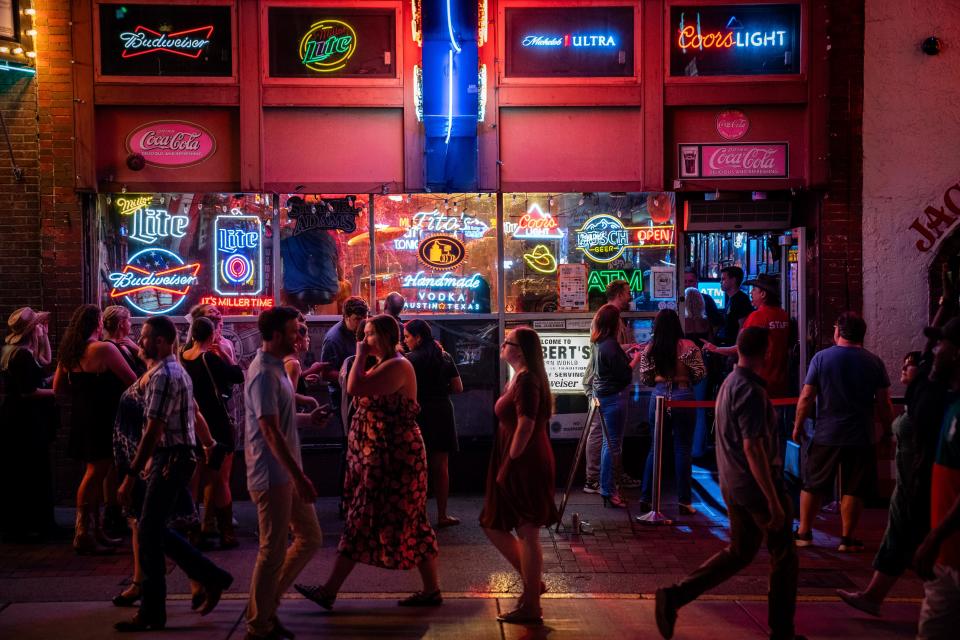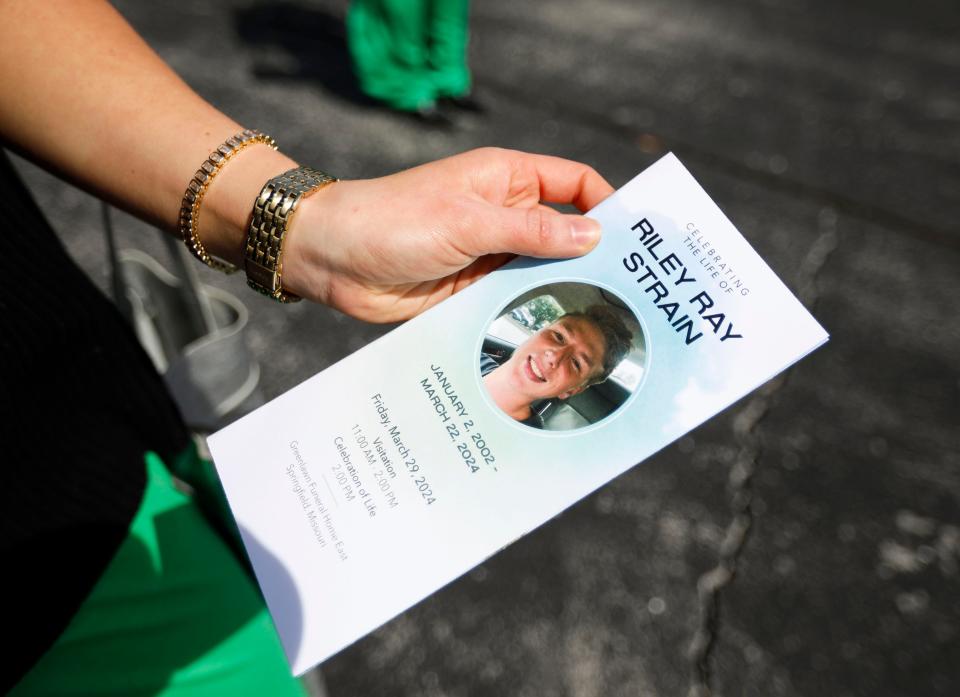No fines for serving drunk customers: Why policing Lower Broadway consumption is so hard
Step out on Lower Broadway on a Saturday night and you’re likely to see more than a few intoxicated people in one of the nation’s top visitor destinations.
The partying in Music City is so pervasive that the town has been jokingly called “a drinking city with a music problem.”
But the recent death of Riley Strain, 22, whose body was found the Cumberland River after he was kicked out of a Lower Broadway bar, and a rise in reports of date rape drugs, has raised concerns over downtown’s safety.
Tennessee’s Alcoholic Beverage Commission is currently investigating whether Luke’s 32 Bridge bar on Lower Broadway overserved Strain before he was kicked out and was later seen on surveillance footage staggering through downtown streets. The bar has maintained that Strain was served just one drink before he was escorted out the Broadway exit. The investigation is pending.
The case could prove difficult. From 2021 through March of this year, the agency cited a dozen establishments across Tennessee for serving alcohol to a visibly intoxicated person. But only one establishment was in Nashville — a restaurant miles away from Lower Broadway that received a $1,500 fine.
The commission says the numbers reflect the challenges in proving such cases and that it works instead to deter violations before they happen.

Still, in light of the Strain's death, the agency said it’s working with law enforcement to pinpoint areas that many need additional surveillance and enforcement.
City leaders also say they’ve made several changes and are working on more improvements to keep Nashville’s reputation as a fun and safe destination in place.
But they’re faced with a challenge: how do you police an area long known for its alcohol culture?
“It would change the nature of downtown,” said John Day, a longtime local lawyer who has handled alcohol liability cases. “That was the environment that we created. You want to change Bourbon Street? It’s the same thing.”
Alcoholic Beverage Commission enforcement
In Davidson County, the state Alcoholic Beverage Commission oversees more than 1,300 licensed establishments with high visibility operations using agents in uniform as well as undercover operations during peak operating hours.
The agency also investigates alcohol-related car crashes to determine whether an establishment violated the law by overserving a visibly intoxicated customer, commission spokesperson Aaron Rummage said in an email.
A review of TABC citations in Nashville over the past year shows the majority include violations for failing to renew licenses and lack of server permits.
Rummage said those types of violations, as well as serving minors, are easier to prove.
Special report: 'A money making machine': Is Nashville's iconic Lower Broadway losing its music soul?
“As with all citations, there must be sufficient proof that a licensee violated the law, which more often than not means eyewitness testimony,” he said. “Sometimes it is fairly simple to prove that a licensee violated the law, for example, if a business serves someone under 21 who is working for the TABC undercover. In that case, the TABC has first-hand knowledge of the licensee’s conduct.”
But with cases where a bar serves a visibly intoxicated person, Rummage said it’s trickier to prove because TABC must rely on witness testimony since it can’t use “visibly intoxicated” undercover agents and has to be “in the right place at the right time.”
With those challenges, he said, the agency works to deter violations with regular unannounced inspections during peak hours, through vetting licensees and continuous training and education.
The commission’s 46 agents conducted 2,780 compliance checks last year, he said.
Strain's death puts spotlight on safety

Strain’s case made national headlines as the Missouri college student was missing for two weeks before his body was found in the river. His death was ruled accidental in a preliminary autopsy, but officials have worried how the case reflects on Nashville.
“We share the goal with the Convention and Visitors Corporation of constantly investing in the safety of the city and particularly the entertainment district because we want not just residents to be safe in their neighborhoods, whether or not they ever go to a honky tonk, but we also want visitors in the city to be safe,” Mayor Freddie O’Connell said in a March 22 public meeting.
More: Friends, family mourn Mizzou student and Kickapoo grad Riley Strain at funeral service
The mayor has suggested placing barriers along the riverfront, as well as more indicators downtown to make sure it’s easier for people to find their way back to a hotel or residence.
He noted that the city recently opened a police substation on Broadway for more enforcement.
“I think overall though, we've taken important steps,” O’Connell said. “And I think this is an important reminder to everyone to also look out for one another. I think some of this is just about how we as a city look after each other as neighbors and as people interacting in the entertainment district.”
Liability for bars
If a bar does serve someone who is visibly intoxicated and that person in turn injures another person, the bar could be held liable in criminal and civil court.
Day, a personal injury lawyer who has practiced in the city for 43 years, said the cases are tough to prove but it can be done with eyewitnesses, surveillance footage and blood-alcohol levels.
But there's a tougher burden of proof in civil cases, as state law requires someone to prove beyond a reasonable doubt that a bar served a visibly intoxicated customer who in turn killed or injured someone.
'Time for a refresh': Even Nashville tourists think downtown's vibe is off
Day represented the widow of Brentwood Police Officer Destin Legieza, who was killed by a drunk driver in 2020 as she drove the wrong way down Franklin Road.
The widow, Heather Legieza, filed a wrongful death case against the bar, Kimbro’s Pickin Parlor, that served the woman before she got into her car that night.
Day said there was sufficient evidence and the case later settled. The bar issued an apology.
Day said state law does not allow a drinker to sue a bar if they are injured after the bar over-served them, nor does it allow family members to sue if a drinker was over-served and later died.
“The drinker does not have a case,” Day said.
Day said any lawsuit against the bar that served Strain would be a tough case since the bar cut him off and asked him to leave.
“The only thing I can think of around that was if there was evidence that the bar undertook some special duty to protect him,” he said.
While enforcing and proving alcohol liability cases is tough, Day said Lower Broadway for the most part is safe largely due to the walkability of the area.
“The good news is that when people are out and walking they’re not getting into a car and the risk of drunk driving is relatively low,” he said.
A push for safe bars
In another concern, Nashville has seen a reported rise in people who believe that have been slipped date rape drugs while out bars and restaurants in downtown.
Of 180 victims who received sexual assault exams at Nashville’s Sexual Assault Center between January 2023 and August, nearly 25% said they believed they were drugged, which staff said was a concerning rise.
The city in response has since invested in a Safe Bar program, which works with local bars and restaurants to educate staff on their role in preventing sexual violence.
The program previously struggled to get more bars to participate, with just about a dozen in Nashville and only one — the Whiskey Bent Saloon — on Lower Broadway.
But with more push from city leaders, the program has since expanded with an extra $75,000 in funding.
About a dozen new bars have since signed up for training. O’Connell, in his meeting last month, touted the program’s growth.
“Most of that initiative is focused on particularly women being safe, but I think we're always exploring ways to make the entertainment district in particular safer,” he said.
Cassandra Stephenson and Kirsten Fiscus contributed to this report.
This article originally appeared on Nashville Tennessean: Riley Strain case: Why Nashville's Broadway bars don't face fines

